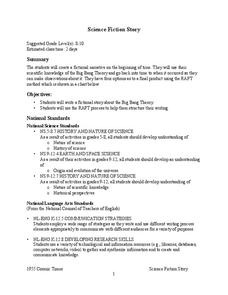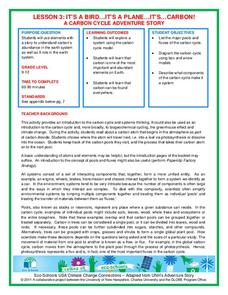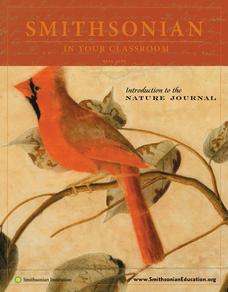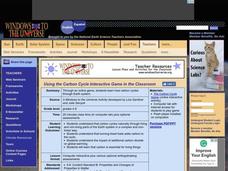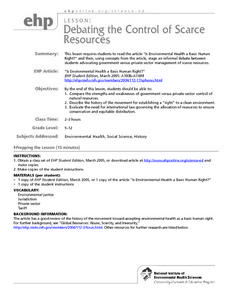NASA
Determining the Nature, Size, and Age of the Universe
Prompt scholars to discover the expansion of the universe themselves. Using photographs of other galaxies, they measure and then graph the size and distance of each. Finally, they draw conclusions and prove the universe is expanding.
NASA
Science Fiction Story
A instructional activity allows you to go back in time and see the big bang actually happen. Bazinga! In reality, pupils research the Big Bang Theory and theorize what it would be like to go back in time and see it happen. There are four...
Teach Engineering
Design Inspired by Nature
Let nature guide your engineering designs. By taking apart a flower, pupils learn about reverse engineering. They use the results to brainstorm designs for new products or ideas. This is the seventh installment of a nine-part Life...
Royal Society of Chemistry
Observing Chemical Changes—Microscale Chemistry
Want to add a wow factor to your current chemical changes lesson plan? Try a microscale experiment with colorful precipitates! Partnered learners conduct 10 single displacement reactions and record their observations.
National Wildlife Federation
It's A Bird...It's A Plane...It's...CARBON!
An interesting lesson takes pupils on a trip through the carbon cycle. A reading passage allows scholars to take notes and make choices about what happens to the carbon on its journey. This third lesson in a series of 21 discusses...
Curated OER
Introduction to the Nature Journal
Students create nature journals. In this introduction to the nature journal lesson, students discover the uses of nature journals and begin their own. Students are challenged to use vivid, concise terms in their descriptive language....
Curated OER
Finding Science in An American Childhood by Annie Dillard
Students read excerpts from Annie Dillard's memoir, "An American Childhood," with the teacher. They experience opportunities to connect English, science, nature and art together from a new and unique perspective. This approach serves as...
Curated OER
Present Simple Exercise Review, 3rd Grade
In this nature worksheet, students watch a nature video, answer multiple choice questions, complete word searches on trees and nature, and more. Students complete 6 activities.
Chicago Botanic Garden
Greenhouse Gas Emissions – Natural and Human Causes
Part three in the series of seven has pupils discussing the different greenhouses gases, learning about the carbon cycle, and then watching a short video about the carbon cycle. Based on their knowledge, individuals complete a greenhouse...
Curated OER
Scavenger Hunt: Simulating Natural Selection
Students simulate natural selection using pinto beans. In this biology lesson, students identify the factors affecting organism evolution. They record data from the experiment and formulate a conclusion.
Curated OER
Changing Planet: Adaptation of Species (Birds and Butterflies)
A video about the impact of climate change on butterfly populations and a PowerPoint about butterfly and bird adaptations warm science learners up for the activity to follow. Using a variety of tools that reprsent unique styles of bird...
Curated OER
Solar-Powered Prints
Combine art and science with this fabulous lesson plan where your class will create solar-powered artwork! They will create a cyanotype, using photo-sensitive paper, sun, and water. A list of necessary materials is provided.
NOAA
Watch the Screen!
Can a sponge cure cancer? Life science pupils visit the drugstore under the sea in the fifth lesson of six. Working groups research the topic then get hands-on experience by testing the inhibiting effects of several plant extracts on E....
Curated OER
Using the Carbon Cycle Interactive Game in the Classroom
An online reading and interactive game bring the path of a carbon molecule to life for your earth science explorers! As an assessment, learners can map out or write about their experience in the carbon cycle. Thoroughly written...
Curated OER
The Perfect Cow?
High schoolers examine how cattle have evolved through natural selection and selective breeding. In this natural selection lesson students compare and contrast natural and artificial selection.
Curated OER
Basics of Environmental Science
Ninth graders explore environmental concerns of the community and identify the basic needs of people, wildlife and domestic animals. Working both individually and in groups, they also define natural resources and compare and contrast...
NASA
Cosmic Microwave Background
Begin your next class with a BANG! Pupils discuss the formation of our universe and its expansion before proceeding with an activity designed to demonstrate what most likely occurred billions of years ago. They conclude with a discussion...
NOAA
To Explore Strange New Worlds
It's time to boldly go where your class has not gone before! The introductory lesson in a five-part series takes young oceanographers aboard the NOAA Ship Okeanos to begin a study of ocean exploration. The lesson includes a comparison of...
NOAA
Plankton
Dive into the world of plankton. The 17th installment of a 23-part NOAA Enrichment in Marine sciences and Oceanography (NEMO) program introduces different types of plankton. Young scientists then use what they have learned to classify...
NOAA
Ocean Exploration
Where am I? The second installment of a 23-part NOAA Enrichment in Marine sciences and Oceanography (NEMO) program starts with pupils guessing the years in which major ocean exploration events took place. The lesson then focuses on how...
NOAA
El Niño
El Nino, La Nina ... and the Santa Maria? The 11th installment of a 23-part NOAA Enrichment in Marine sciences and Oceanography (NEMO) program explains the mechanism of El Nino/Southern Oscillation. Pupils use previous data to determine...
NOAA
Coastal Dynamics
Life's a beach! The 16th installment of a 23-part NOAA Enrichment in Marine sciences and Oceanography (NEMO) program first examines different types of coasts and how they form. An activity then has learners investigate the shoreline...
NOAA
Invertebrates
Crabs and lobsters ... yum! The 18th installment of a 23-part NOAA Enrichment in Marine sciences and Oceanography (NEMO) program focuses on invertebrate marine life. After the lecture slideshow, learners conduct an activity to sample...
Curated OER
Debating the Control of Scarce Resources
High schoolers examine the issue of government versus private sector control of natural resources. They read an article, evaluate the need for international law governing resource allocation, and participate in a class debate.



